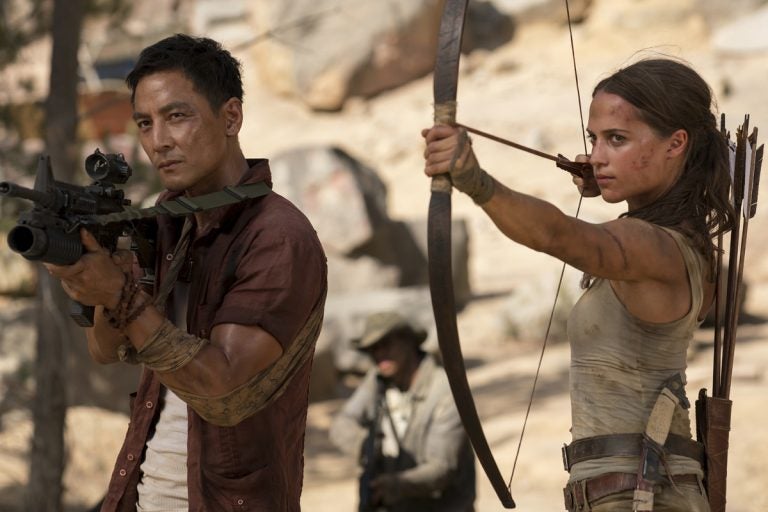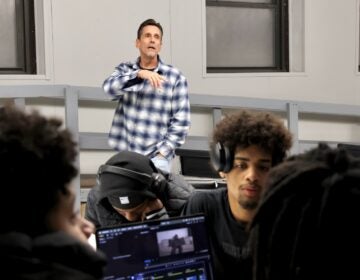Can ‘Tomb Raider’ end the curse of Hollywood video game flops?
As video games evolved from side-scrolling beat-em-ups to intricately layered, cinematic narratives, why didn’t films based on them get any better?

This image released by Warner Bros. Pictures shows Daniel Wu, left, and Alicia Vikander in a scene from "Tomb Raider." (Ilze Kitshoff/Warner Bros. Pictures via AP)
“Video games can never be art,” legendary film critic Roger Ebert once declared. The comment caused Ebert no end of grief from gamers, although he never really took it back, asserting that games were distractions not works of art.
Surprisingly, it doesn’t appear that he ever addressed any instances in which video games and movies crossed paths. Perhaps that’s because a beloved film based on a video game has yet to be released.
In a landscape currently ruled by movies based on comic books, another often-derided niche of pop culture, the failure of films based on video games prominently stands out. This deficiency, however, can’t be attributed to lack of effort.
After the enormous success of the Super Mario Bros. series of games, Nintendo sold the rights to make a live-action motion picture that hit the big screen in 1993. The picture bombed after critics and audiences recoiled at the result.
The “Super Mario Bros.” movie was innovative in all the wrong ways. The original director was pushed out, the new directors were in over their heads and there were constant rewrites. The actors rebelled, and the whole mess hit the papers before the film was released. It even ended with a set up to a sequel and a post-credits scene.
The ’90s were filled with similar shortsighted efforts, with 1995’s “Mortal Kombat” becoming the only real financial success — though it still received a thumbs-down from critics. (More than 20 years later, Collider would pick it as the best video game pic, practically by default.)
The new millennium had a promising start with “Lara Croft: Tomb Raider” in 2001 and “Resident Evil” in 2002. Starring Angelina Jolie and Milla Jovovich, respectively, the films did all right at the box office, but they were still rejected by critics. Improbably enough, the more high-profile Croft and Jolie flamed out after one sequel, while “Resident Evil” became the sole video game franchise, thanks to low budgets and hard-core fans who ignored expert opinion.
In the years ahead, there were even more big-budget box office bombs. Universal’s adaptation of the popular “Doom” series of games in 2005 earned just $56 million against a $60 million budget. The biggest flop came five years later over at Disney when its $200 million misfire, “Prince of Persia: The Sands of Time,” experienced nine-figure losses.
This long drought was projected to end at last in 2016 with the arrival of two prime contenders: “Warcraft” and “Assassin’s Creed.”
Both were mega-budget adaptations of long-running popular video game series. The former had director Duncan Jones, scion of David Bowie and a renowned up-and-comer who’d helmed cult hits “Moon” and “Source Code.” And the latter had an all-star cast led by Michael Fassbender alongside Oscar-winners Marion Cotillard and Jeremy Irons.
“Warcraft” buckled under the pressure as fan response was lukewarm and critics were disappointed. The Chinese box office saved it from total failure, but any hopes for a franchise are gone. “Assassin’s Creed” managed to be even worse and lost millions.
Ironically, 2016 would also see the release of the animated kid flick “The Angry Birds Movie” which earned nearly $350 million despite the fact that adults didn’t much care for it.
Now, once again, two movies are striving to break the curse. Warner Bros. is set to premiere a reboot of “Tomb Raider” Friday. The franchise is popular. It has an Indiana Jones vibe that should be make for prime blockbuster material, and it can learn from the mistakes made by the Jolie predecessors.
Lara Croft will be played by Academy Award-winner Alicia Vikander (who coincidentally is married to Fassbender). Judging by trailers, it seems WB is going for a “Batman Begins”-style origin story despite the fact that many have traversed that path and failed.
On the other hand, WB has another video game adaptation set for April 13 that couldn’t be more different. Loosely based on the 1980’s upright arcade classic, “Rampage” stars Dwayne Johnson (aka The Rock) in an action-packed adventure. Johnson’s record with the recent “Jumanji” sequel and disaster pic “San Andreas” suggest the picture is slated to be a success. Although it’s worth remembering “Baywatch,” which proved even The Rock has the occasional flop.
Will either of these entries become the first universally beloved and wildly successful video game movie? Probably not.
Which raises the question: As video games evolved over the past decades from side-scrolling beat-em-ups to intricately layered, cinematic narratives, why didn’t films based on them get any better?
Maybe Ebert was right and there is something intrinsically missing from the medium of video games that makes adapting them to the screen so difficult. Yet this strikes me as impulsive and ignorant.
Sure, video games are interactive in a way films aren’t, but they’re still based on a story. And there’s still a bit of stigma attached to the genre, which only a big success can break. After the first truly great video game movie breaks through, we’ll wonder why we ever doubted such a feat could be achieved.
“If it can be written or thought,” legendary filmmaker Stanley Kubrick once said, “it can be filmed.”
WHYY is your source for fact-based, in-depth journalism and information. As a nonprofit organization, we rely on financial support from readers like you. Please give today.





